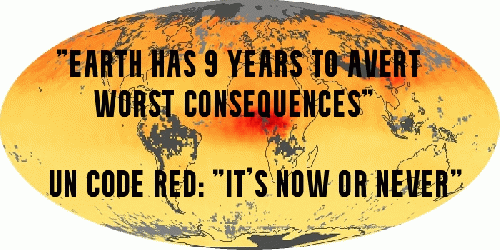Has the staggering deluge of reports of climate change catastrophes around the world desensitized people from responding with appropriate alarm? Have we lost sight of a narrowing window for effective action to halt the accelerating warming of the planet before climate doomsday?
Like the monster hurricane that struck Florida on August 28, 2022, which was just 2 mph short of a category 5, weather disasters are routinely called "rare, unprecedented, and historic." But so far not devastating enough or terrifying enough to shake people loose from their complacency about climate change. Surprisingly, most of the talk in response to hurricane Ian is about rebuilding damaged or destroyed property, not defeating climate change to prevent repeats or worse storms.
It's also noteworthy that many of the presentations during climate week in September 2022 and later were about projects that even if brought to full functionality would have little impact on stopping the warming of the planet. Oblivious to alarms, some presenters boasted that their projects would scale up by 2050--too late for the ticking clock. We may have created a vast worldwide climate industry that as passionate, dedicated, and well-intentioned as it may be, it's feeding the illusion that climate change is being addressed effectively when in fact it is not.
The sad truth is that despite decades of innovative programs, international treaties, pledges by governments to achieve net zero carbon emissions, extensive worldwide advocacy, and hundreds of billions invested in efforts to slow and defeat climate change the world is in worse shape and closer to a climate apocalypse than in 2006 when Al Gore's Film An Inconvenient Truth warned about the coming climate change catastrophes. As generous as they might seem, the efforts have been inadequate to meet the dimensions necessary to combat climate change. And current plans and proposals are similar and therefore not likely to make a significant difference.
That's what prompted Elizabeth Kolbert, eminent science journalist and author of the Pulitzer Prize-winning book The Sixth Extinction, to tell editor David Remnick on the NPR New Yorker Hour on August 12, 2022, that all the climate programs, like before, will only "make things worse or less worse."
In February 2021, John Kerry, U.S. special presidential envoy for climate, warned that "Earth has 9 years to avert the worst consequences of the climate crisis: There's no faking it on this one." Earlier, in 2017 fifteen thousand (15,000) scientists issued a dire warning that the window for defeating climate change is closing. After issuing a code red in 2021 the UN confirmed the emergency in 2022 with the scare "It's 'now or never"
If climate doomsday is indeed approaching, it may be better if a colossal disaster happens sooner rather than later. While this recommendation sounds cynical and horrific, a tremendous disaster offers the possibility--perhaps the only prospect--of the world finally waking up and effectively implementing the extreme conservation measures that can defeat climate change with time to prevent worse disasters.
Scientists have cited vast evidence that climate change is heading toward points of no return. In 2008 they warned that CO2 in the atmosphere should not breach 350 parts per million (ppm); yet in May 2022 CO2 peaked at 421 ppm--"territory not seen for millions of years." And if the warming of the planet increases by just 1.5 degrees centigrade it could, they say, lead to out-of-control levels with devastating consequences. Warning signs have already occurred. 2021 was among the warmest years ever recorded, with temperatures as high as 120 degrees fahrenheit in some countries. In 2022, China experienced a 70-day heat wave over a large section of southern provinces, with temperatures greater than 100 degrees and as high as 110 degrees on some days, breaking all records.
(Note: You can view every article as one long page if you sign up as an Advocate Member, or higher).






